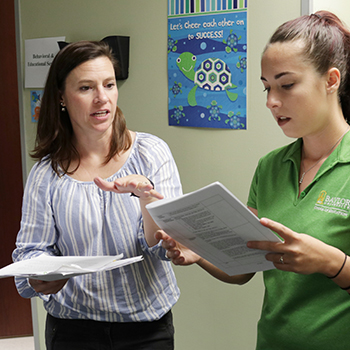
Samantha Rivera gained experience teaching literacy in small groups at the Baylor Center for Developmental Disabilities.
Autism might not be what you think it is. “Some behaviors associated with autism are much more manageable than people think, especially in academic settings,” said Dr. Tracey Sulak, Clinical Associate Professor in the Department of Educational Psychology. “You can integrate some children with autism into a regular academic setting, but you have to know how to do it.”
Baylor sophomores learned just that — and more — through a hands-on teaching experience offered at the Baylor Center for Developmental Disabilities (BCDD) for the first time in the spring. Previously, the field experience associated with Sulak’s class, Literacy for Learners with Special Needs, was taught in a school setting. Sulak moved the class to an afternoon time slot so that she could create a community after-school academic program at the BCDD for children from multiple schools and also for children who were already clients of the BCDD’s behavior-based programs.
One advantage of the BCDD setting, Sulak said, was that Baylor students could teach BCDD children who have been diagnosed with autism or other developmental disabilities, along with those who are identified only as “struggling readers,” pulled from local schools. There were 20 young students in the inaugural program; seven children were BCDD clients, and 13 were from two area schools. “We had them all mixed together to simulate an inclusion experience for the Baylor students,” Sulak said.

Dr. Tracey Sulak could provided real-time, on-site guidance to her students who were teaching at the BCDD.
Sulak’s 15 Baylor students are majoring in Special Education or in Elementary Education with a dual certification in Special Education. They began the spring semester in a Baylor classroom, learning the tools needed to assess a reading deficiency, develop an intervention strategy, design and teach an intervention, and measure the child’s progress. Their seven-week field experience started after Spring Break. Working in groups with three or four children, they taught at the BCDD every Tuesday and Thursday afternoon, under the guidance of Sulak and three graduate students studying Applied Behavior Analysis.
Having the support and feedback from the graduate students was another benefit of working at the BCDD, Sulak said. “It’s a true collaboration and integration of these two programs, and in any other setting it would not be available to us.”

Reading groups were part of the literacy teaching experience for Baylor student Mary Lea Phillips and others.
Junior Mary Lea Phillips, who is majoring in Elementary Education with a dual certification in Special Education, was enrolled in the spring as a sophomore. She said she thinks the children enjoyed visiting the BCDD. “It’s nice for the children to be in a setting that is not their school — a fresh place with fresh faces,” she said. “It’s someplace different for them, where they come to learn specific skills and have some fun.”
Sulak said that the program also offered a multi-cultural experience for the Baylor students, because some of the children and their families were English learners. “They learned how to be culturally sensitive and how to translate documents — things they will need to know as teachers,” Sulak said.
Phillips, who would like to eventually be a diagnostician, said she learned a lot through the class, especially with Sulak and the graduate students on site for support. “I will carry these lessons with me,” she said. “I think as a senior teaching intern, I might be using some of these lesson plans in my classroom.”
Sulak said the class will be offered again in the spring of 2018 and that the faculty members in the Department of Education Psychology are constantly seeking new avenues to deepen and enrich hands-on field experiences for Baylor students.
For more news from Baylor School of Education, visit the Instant Impact home page.
ABOUT BAYLOR SCHOOL OF EDUCATION
Founded in 1919, Baylor School of Education ranks among the nation’s top 20 education schools located at private universities. The School’s research portfolio complements its long-standing commitment to excellence in teaching and student mentoring. Baylor’s undergraduate program in teacher education has earned national distinction for innovative partnerships with local schools that provide future teachers deep clinical preparation, while graduate programs culminating in both the Ed.D. and Ph.D. prepare outstanding leaders, teachers and clinicians through an intentional blend of theory and practice.
ABOUT BAYLOR UNIVERSITY
Baylor University is a private Christian University and a nationally ranked research institution. The University provides a vibrant campus community for more than 16,000 students by blending interdisciplinary research with an international reputation for educational excellence and a faculty commitment to teaching and scholarship. Chartered in 1845 by the Republic of Texas through the efforts of Baptist pioneers, Baylor is the oldest continually operating University in Texas. Located in Waco, Baylor welcomes students from all 50 states and more than 80 countries to study a broad range of degrees among its 12 nationally recognized academic divisions.
